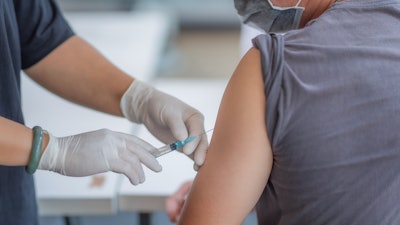
NEW YORK (AP) — As more coronavirus vaccine doses become available in the weeks and months ahead, many business owners face a difficult decision: whether to require employees to be inoculated.
And if they decide “yes,” they have to be ready for the possibility that some staffers will refuse.
Dentist Andrew Geller initially didn’t feel comfortable with requiring his staff to get the shots because of the many unknowns about the vaccine. But he did extensive research and concluded that the 23 employees at Geller Family Dental should be vaccinated. Turns out most were grateful that as health workers they could receive the vaccine when it first arrived.
However, Geller did have more difficult conversations with a handful of employees who were uneasy about getting the shots.
“I did my best to ensure them that this was going to maintain the health and safety of their families. It took a little bit longer for some to make an appointment, but they did, thankfully,” says Geller, whose practice is located in Bronxville, New York.
State governments determine who can be vaccinated and when; in most states, priority has been given to health workers, first responders and older people, but employees of some businesses — for example, restaurant workers in New York — are eligible. The general population isn’t expected to be vaccinated until the spring at the earliest, so most business owners still must decide what their policy on vaccinations will be.
It's not known how many employers will require staffers to get the vaccine — and many companies likely haven't made a decision. About two-thirds of Americans say they plan to get vaccinated or have already done so, according to a poll released Wednesday by The Associated Press-NORC Center for Public Affairs Research. The survey also found that 15% of Americans say they will definitely not get the vaccine and another 17% say they probably will not.
Employers can require many staffers to be vaccinated under guidelines from the Equal Employment Opportunity Commission. They can’t require inoculations for employees with medical conditions protected by the Americans with Disability Act or those who object to vaccinations for religious reasons. The ADA covers employers with 15 or more workers, and some state and municipal laws cover smaller businesses. Owners must find what the law calls a reasonable accommodation to allow these staffers to keep working. One example during the pandemic would be an assignment that could be done in a space a safe distance from co-workers or customers.
Employers have been contacting attorneys and human resources consultants and asking, what should we do?
“We are having some very honest and real conversations with clients to make sure it’s the right decision for them,” says Fernanda Anzek, a consultant with the human resources provider Insperity.
A frequently asked question is whether an employer can dismiss a staffer who refuses to be vaccinated and who isn’t protected by law. The short answer is yes.
“The employer has the latitude under the EEOC to keep the workplace safe,” says Jerry Maatman, an employment law attorney with Seyfarth Shaw in Chicago. But Maatman cautions that while the EEOC has released guidelines about the vaccine, issues over employers’ rights to dismiss staffers who don’t comply are likely to end up in court.
“These rulings are going to take place in the second and third quarters,” he says.
Maatman and Anzek advise businesses to seek legal or human resources advice before disciplining or dismissing employees over vaccinations, whether or not the staffers are in what’s called a protected class.
Legal and HR experts also recommend employers create companywide policies on vaccinations, provide each staffer with a copy and explain to everyone why the shots are necessary. And owners should keep in mind that this is a subject that requires sensitivity and understanding — an overbearing approach can be a morale buster.
“The best plan is education and policies and letting employees know that everything is uniform and you’re not singling anyone out,” says Andrew Zelmanowitz, an employment attorney with Berger Singerman in Fort Launderdale, Florida.
Owners may feel some trepidation before broaching the topic. Joann Butler decided to ask her 10 staffers how they felt about getting vaccinated, and “fortunately, everyone agreed it was something we need to do.”
“It’s always a slippery slope when you mandate something like this — with religious and health issues, not everyone is gung-ho,” says Butler, owner of Consultancy Media, a broadcast and production studio in New York.
The circumstances of a particular workplace can make the conversations easier. When Denise Buzy-Pucheu talked to the three staffers at her Newtown, Connecticut, bridal shop, “they were very on board — they want to keep safe,” she said. While in many stores the sales associates can keep a safe distance from shoppers, or have plastic barriers at checkout counters, employees of The Persnickety Bride have to help customers get in and out of gowns. There's no way to do that without being right next to a bride.
“They understand the severity of this,” Buzy-Pucheu says of her staffers. “We are physically in touch with people.”
Some employers have opted to let staffers make their own decisions. Finally Restaurant Group, which operates 15 restaurants in four western states and Louisiana, is offering information about the vaccines and time off for employees to get them, but isn't requiring shots.
“We're letting them know what their options are, and they can make choices themselves,” says Ashley O'Bryan, director of human resources for the Bozeman, Montana-based company.
At Knead Hospitality & Design, a restaurant group in Washington, D.C., hourly employees are being offered four hours pay and those on salary will get a day of paid time off if they are inoculated.
While co-founders Jason Berry and Michael Reginbogin want their employees to be vaccinated and are offering them incentives to get the shots, they're stopping short of requiring inoculations.
“There are a lot of people out there who are vaccine hesitant for religious and ethical reasons. I don‘t think it‘s our job to tell people how to live their life,” Berry says.
Restaurant workers come in close contact with diners, but “we hope there’ll be enough peer pressure or excitement to get people on board on their own volition,” Berry says.






















